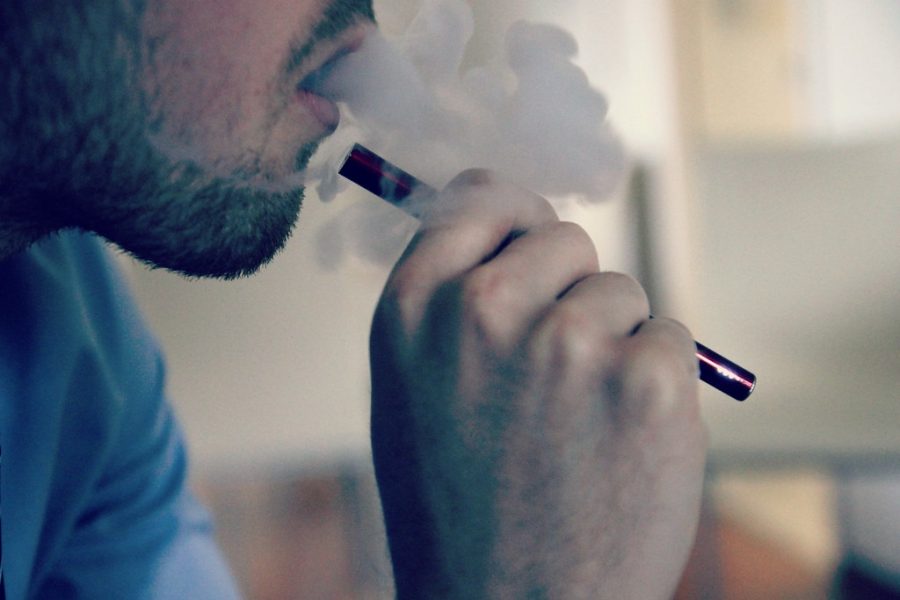Administration attempts to puff out vaping
The use of vapes and e-cigarettes at WCHS have grown into a harmful and dangerous situation, and for this reason the administration is considering taking new precautions to prevent their use at school.
May 8, 2019
Following recent, notable events at school involving THC addictions and the use of vape pens, the WCHS administration is looking into new policies restricting the presence of drugs on school grounds and in classrooms.
With now being a better time than ever to initiate discussions about the hazards that vaping and drug use pose on the WCHS community, Principal Brandice Heckert has since released statements detailing the consequences of such activities. Heckert and the administration hope to utilize these drug related events at WCHS to campaign for the safety of the student population.
“We need to focus on educating our students and community about the dangers of vaping, since many people, especially parents, don’t always recognize them,” Heckert said. “I have put out a lot of resources for this purpose, but we have to work together to find a solution to this issue.”
As more students begin to understand the dangers of vaping, the administration can begin to take greater measures to ensure a safer, drug-free environment.
“Strengthening education and raising awareness of the dangers of vaping are key,” Heckert said. “We have looked into different campaigns and lessons in health classes to help students, along with potentially bringing in speakers to talk about their experiences.”
The importance of education and advocacy does not just exist within the classroom; raising awareness of how vaping can affect the families of our community is still incredibly crucial. Fortunately, many students are starting to openly speak with their parents about the impacts of vaping and what they can do avoid becoming involved in this dangerous trend.
“I have had discussions with my parents and teachers about the dangers of vaping and drug use,” senior Julia Greenberg said. “Adults in my life have clearly shown me the negative effects these things can have on my life—taking a toll on my mental and physical health.”
Despite the efforts to raise awareness of the dangers of vaping by parents and faculty alike, substance abuse still has a rather large presence within WCHS. This has resulted in numerous drug related incidents involving students and staff that could have been otherwise easily preventable.
“Unfortunately, students often need to see someone else experiencing a negative consequence in order to deter that behavior,” Heckert said. “I firmly believe that if anyone who uses vapes felt that they could be harmed or potentially experience a situation that is out of their control, they would not get involved.”
Along with the administration, many WCHS students are working to change the perception of underage drug addiction.
“While I do have close friends and know people who engage in vaping, I try to display disapproval towards their use of vapes,” Greenberg said. “I usually explain some of the negative impacts that vaping can have on their lives and point them towards resources that can help them stop.”
The main conflict and dilemma with vaping is that it is likely to never truly go away, due to the relative simplicity involved in obtaining and using one. Although it is implausible and unrealistic to expect vaping to completely vanish, it is not impossible to help our communities better understand what they can do to prevent serious incidents from occurring.
“I think because it is so easy to become involved in vaping and drug use, the effects they can have on us have diminished,” Heckert said.
In order to spark real change in how drugs and vaping are perceived by the WCHS community, the student population needs to become more involved in the current events and issues that affect our school as a whole. This could include an increase in activity within the community, or engaging and working together with the administration.
“I think administration should enforce a more strict policy against vapes to ensure students do not engage in these activities during school and to prevent it from occurring outside of school as well,” Greenberg said. “I believe administration should also reach out to students who might be participating in these activities and ensure that we are mentally and physically healthy.”
Ultimately, regardless of the result of any decisions made by administration, it is crucial to understand that the WCHS community should not tolerate the active use of drugs on school grounds and that underage vaping addictions have no business within this school.
“While choosing to vape is certainly reckless, it also comes with being an adolescent and that is often difficult for us to accept,” Heckert said. “There is a lot societal pressure from our peers and everyone around us, but we need to remember that we should be making decisions that help us stay engaged in our education and community.”


